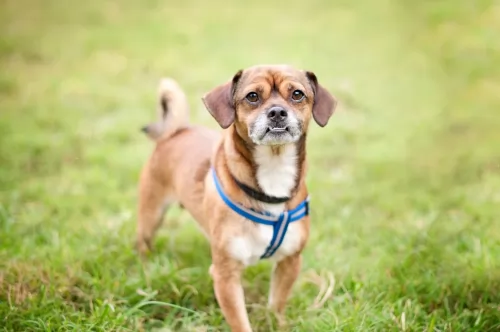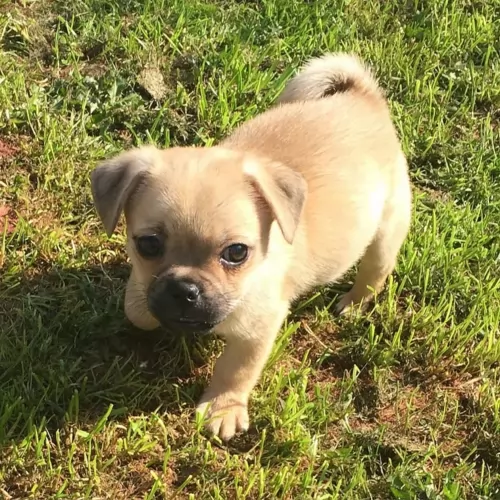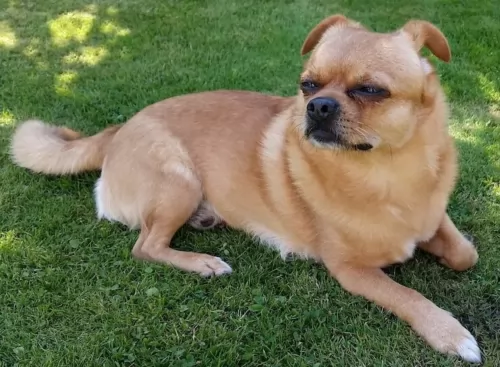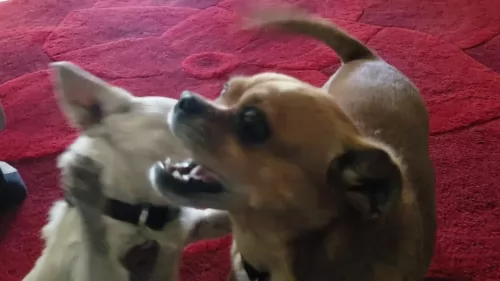 Petzlover
Petzlover Chug is originated from United States but Stabyhoun is originated from Denmark. Chug may grow 28 cm / 11 inches shorter than Stabyhoun. Chug may weigh 41 kg / 90 pounds lesser than Stabyhoun. Both Chug and Stabyhoun has almost same life span. Both Chug and Stabyhoun has almost same litter size. Chug requires Moderate Maintenance. But Stabyhoun requires Low Maintenance
Chug is originated from United States but Stabyhoun is originated from Denmark. Chug may grow 28 cm / 11 inches shorter than Stabyhoun. Chug may weigh 41 kg / 90 pounds lesser than Stabyhoun. Both Chug and Stabyhoun has almost same life span. Both Chug and Stabyhoun has almost same litter size. Chug requires Moderate Maintenance. But Stabyhoun requires Low Maintenance
 The Chug is a crossbreed with the Pug and the Chihuahua. It is a hybrid not a purebred. Over the past ten to fifteen years people have been developing the Chug, mostly in the United States. People were looking for a lapdog with the characteristics of both the Chihuahua and the Pug. The hybrid dog has characteristics of both breeds, both physical and behavioral. Of course, the Chug is not recognized by the AKC, but it is recognized by hybrid and designer dog clubs such as The American Canine Hybrid Club, Designer Breed Kennel and the International Designer Canine Registry.
The Chug is a crossbreed with the Pug and the Chihuahua. It is a hybrid not a purebred. Over the past ten to fifteen years people have been developing the Chug, mostly in the United States. People were looking for a lapdog with the characteristics of both the Chihuahua and the Pug. The hybrid dog has characteristics of both breeds, both physical and behavioral. Of course, the Chug is not recognized by the AKC, but it is recognized by hybrid and designer dog clubs such as The American Canine Hybrid Club, Designer Breed Kennel and the International Designer Canine Registry.
 The Stabyhoun is a near extinct breed and one of the rarest ever. He was never recognized by the major kennel clubs but was entered into Foundation Stock Services.. The breed comes from the Netherlands in the Frisian Forest and has been known since the early nineteenth century.
The Stabyhoun is a near extinct breed and one of the rarest ever. He was never recognized by the major kennel clubs but was entered into Foundation Stock Services.. The breed comes from the Netherlands in the Frisian Forest and has been known since the early nineteenth century.
It was not known outside of the Friesland Forest area until the 1960’s and outside the Netherlands only since the twenty first century. The Stabyhoun is a Dutch national treasure whose name means “stand by me dog”. Today throughout the world only a few thousand remain.
The Stabyhoun is hunter and retriever with a soft-mouth and ability to point. He was used for duck hunting and finding upland birds. He is great in the water, sharp-eyes and efficient, he works quickly. The breed has also been known to hunt fox, other birds and small game. They are great at catching moles.
Even though British breeds are more popular for hunting now, the Stabij remains an excellent all round hunter. He can track, point, and retrieve. He is also a good watchdog though his disposition is peaceful and gentle. They needed to be general all around farm dogs as farmers could only afford one dog.
They have not changed much since the 1800’s either in function or appearance. In order to get such a gentle working dog, they early Stabyhoun has been mixed with the much older and rarer breed from the same area, the Wetterhoun. This crossbreeding was stopped in 1942 in order to gain breed recognition and hope to keep either of these two rare breeds from extinction.
Today the number of Stabyhoun in the Netherlands, the United Kingdom, North America and Scandinavia are slowly but surely increasing. He is highly prized as an independent thinker and hunter, inquisitive and gentle. They are related to the Heidewachtel and the Drentsche Patrijshound.
The first Staby born in the U.S. was around 1994 and in 2017 there were thought to be over 7000 Stabyhouns in the world. They are much more popular now in Europe and North America.
 The Chug can vary greatly in looks and build from one dog to another. For the most part however, Chugs are small compact dogs, sturdy and muscular. They have a very expressive and lovable face with folding ears, almond shape eyes and short muzzles. Their faces are similar in looks to that of a miniature boxer. .
The Chug can vary greatly in looks and build from one dog to another. For the most part however, Chugs are small compact dogs, sturdy and muscular. They have a very expressive and lovable face with folding ears, almond shape eyes and short muzzles. Their faces are similar in looks to that of a miniature boxer. .
 The Staby are powerful soft-mouthed pointers who are not too fine or too robust with tightly fitting skin. Their chest, legs, collar and tail are feathered and make the dog look like a longhaired canine, but she really is not. The dog is longer than it is tall, and his head is longer than it is wide. Most of the breed are black and white but there are many brown and white, while the orange and white are very close to extinction.
The Staby are powerful soft-mouthed pointers who are not too fine or too robust with tightly fitting skin. Their chest, legs, collar and tail are feathered and make the dog look like a longhaired canine, but she really is not. The dog is longer than it is tall, and his head is longer than it is wide. Most of the breed are black and white but there are many brown and white, while the orange and white are very close to extinction.
They have a slightly domed skull and a slightly arched but strong neck. Their muzzle is broad and the bridge straight while the nose is well developed. With medium sized ears, set low on the head and having the bottom third of the ears covered with hair. The eyes are round, medium sized and level in the head
They have a long sleek coat with a slightly wavy croup. They are never curly. Its back is straight, tail long and loin powerful.
 Because they are a hybrid, chugs can have a very wide range of different characteristics depending upon whether they have more from the Pug or more from the Chihuahua. But either way they are very lovable little dogs with big personalities. Regardless of whether your dog favors the clown Pug or the stately Chihuahua, your puppy will be a lovable ball of fur. He will be affectionate, friendly and aggressive to bigger dogs.
Because they are a hybrid, chugs can have a very wide range of different characteristics depending upon whether they have more from the Pug or more from the Chihuahua. But either way they are very lovable little dogs with big personalities. Regardless of whether your dog favors the clown Pug or the stately Chihuahua, your puppy will be a lovable ball of fur. He will be affectionate, friendly and aggressive to bigger dogs.
 Though an isolated, rare breed for so long, the Stabyhoun does have several known health issues including:
Though an isolated, rare breed for so long, the Stabyhoun does have several known health issues including:
• PDA or Patient Ductus Arteriosis – heart issue from 6 weeks on. Major vessel does not close. With surgery it can be corrected.
• Type 1 von Willebrand’s Disease (vWB) – a bleeding disorder in its mildest form. DNA testing is available not required.
• Cerebral dysfunction – rare compulsive behavior at 6 weeks. It is fatal at this point. DNA testing will be required.
 Pugs have great appetites and love to eat and Chihuahuas wont turn down a meal so be careful not to overfeed your Chug. It is important to feed a small breed formula whether you use dry or wet food.
Pugs have great appetites and love to eat and Chihuahuas wont turn down a meal so be careful not to overfeed your Chug. It is important to feed a small breed formula whether you use dry or wet food.
Some additional issues that Chugs deal with in respect to health include:
Both elbow and knee inflammations can lead to arthritis and lameness
Chugs can have runny eyes or cherry eye. If they have cherry eye you will want to treat it immediately or there could be secondary issues with inflammation and infection.
Chugs may be little, but they still need a moderate amount of exercise every day. A regular walk will do or indoor or outdoor playtime every day. They like obedience, rally and some can do small dog agility, but they would have to be on the larger size for Chugs. Chugs also make great therapy dogs.
 1Feeding the puppy -They are prone to obesity. Do not overfeed. Watch calories. Feed a high quality dog food meant for active medium sized dogs in 3-4 meals per day.
1Feeding the puppy -They are prone to obesity. Do not overfeed. Watch calories. Feed a high quality dog food meant for active medium sized dogs in 3-4 meals per day.
2.Feeding the adult – Feed a high quality dog for medium sized dogs in 2-3 meals per day.
An active dog that needs exercise. They need mental stimulation as much or more than they need physical. Don’t skimp on either. They love agility, field trials, lure coursing, and scent training. They also love the triathlon, frisbee and endurance.